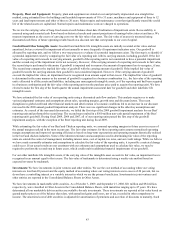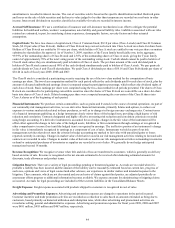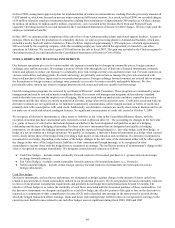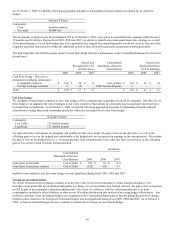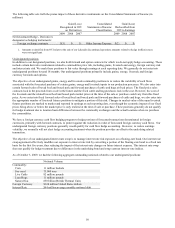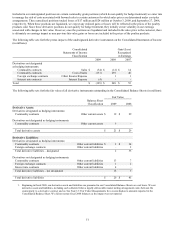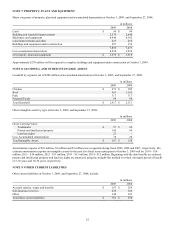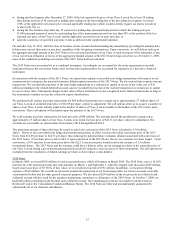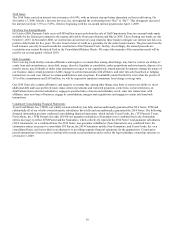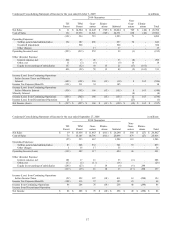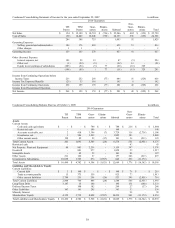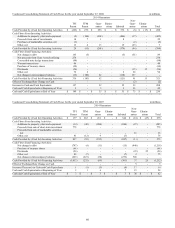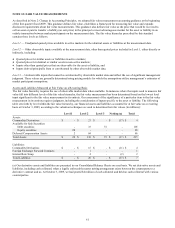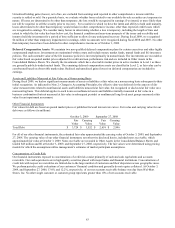Tyson Foods 2009 Annual Report Download - page 53
Download and view the complete annual report
Please find page 53 of the 2009 Tyson Foods annual report below. You can navigate through the pages in the report by either clicking on the pages listed below, or by using the keyword search tool below to find specific information within the annual report.
53
NOTE 10: COMMITMENTS
We lease equipment, properties and certain farms for which total rentals approximated $175 million, $163 million and $133 million,
respectively, in fiscal 2009, 2008 and 2007. Most leases have terms up to six years with varying renewal periods. The most significant
obligations assumed under the terms of the leases are the upkeep of the facilities and payments of insurance and property taxes.
Minimum lease commitments under non-cancelable leases at October 3, 2009, were:
in millions
2010
$
79
2011
67
2012
53
2013
34
2014
21
2015 and beyond
22
Total
$
276
We guarantee debt of outside third parties, which consist of a lease and grower loans, all of which are substantially collateralized by
the underlying assets. Terms of the underlying debt cover periods up to nine years, and the maximum potential amount of future
payments as of October 3, 2009, was $59 million. We also maintain operating leases for various types of equipment, some of which
contain residual value guarantees for the market value of the underlying leased assets at the end of the term of the lease. The terms of
the lease maturities cover periods up to six years. The maximum potential amount of the residual value guarantees is $55 million, of
which $23 million would be recoverable through various recourse provisions and an additional undeterminable recoverable amount
based on the fair market value of the underlying leased assets. The likelihood of material payments under these guarantees is not
considered probable. At October 3, 2009, and September 27, 2008, no material liabilities for guarantees were recorded.
We have cash flow assistance programs in which certain livestock suppliers participate. Under these programs, we pay an amount for
livestock equivalent to a standard cost to grow such livestock during periods of low market sales prices. The amounts of such
payments that are in excess of the market sales price are recorded as receivables and accrue interest. Participating suppliers are
obligated to repay these receivables balances when market sales prices exceed this standard cost, or upon termination of the
agreement. Our maximum obligation associated with these programs is limited to the fair value of each participating livestock
supplier’s net tangible assets. The potential maximum obligation as of October 3, 2009, is approximately $250 million. The total
receivables under these programs were $72 million and $7 million at October 3, 2009, and September 27, 2008, respectively, and are
included, net of allowance for uncollectible amounts, in Other Assets in our Consolidated Balance Sheets. Even though these
programs are limited to the net tangible assets of the participating livestock suppliers, we also manage a portion of our credit risk
associated with these programs by obtaining security interests in livestock suppliers' assets. After analyzing residual credit risks and
general market conditions, we have recorded an allowance for these programs' estimated uncollectible receivables of $20 million and
$2 million at October 3, 2009 and September 27, 2008, respectively.
The minority partner in our Shandong Tyson Xinchang Foods joint ventures in China has the right to exercise put options to require
us to purchase their entire 40% equity interest at a price equal to the minority partner’s contributed capital plus (minus) its pro-rata
share of the joint venture's accumulated and undistributed net earnings (losses). The put options are exercisable for a five-year term
commencing the later of (i) April 2011 or (ii) the date upon which a shareholder of the minority partner is no longer general manager
of the joint venture operations. At October 3, 2009, the put options, if they had been exercisable, would have resulted in a purchase
price of approximately $74 million for the minority partner’s entire equity interest. We do not believe the exercise of the put options
would materially impact our results of operations or financial condition.
Additionally, we enter into future purchase commitments for various items, such as grains, livestock contracts and fixed grower fees.
At October 3, 2009, these commitments totaled:
in millions
2010
$
423
2011
36
2012
19
2013
11
2014
8
2015 and beyond
22
Total
$
519


